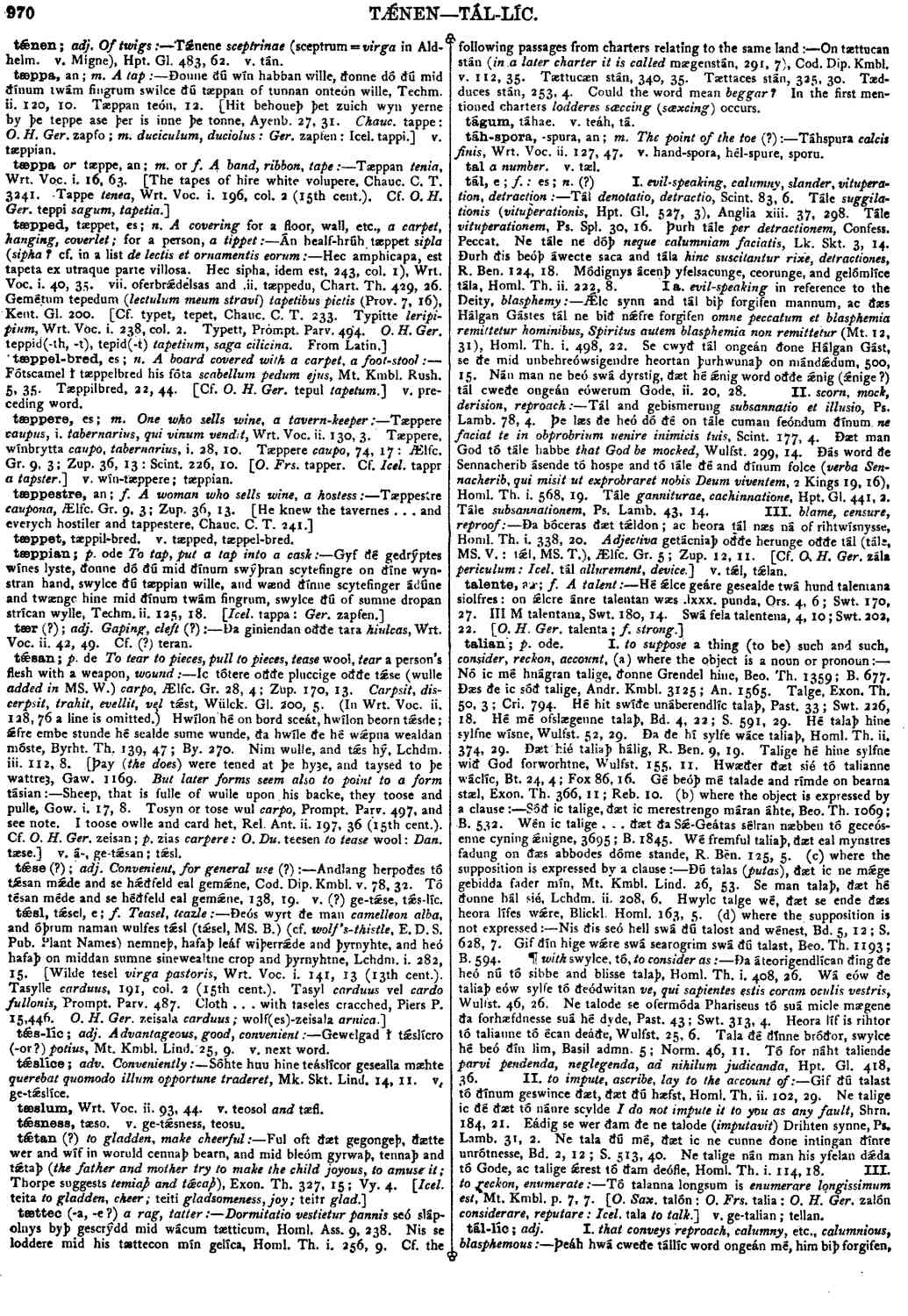talian
- verb [ weak ]
-
Nó ic mé hnágran talige, ðonne Grendel hine,
- Beo. Th. 1359;
- B. 677.
-
Ðæs ðe ic sóð talige,
- Andr. Kmbl. 3125;
- An. 1565.
-
Talge,
- Exon. Th. 50, 3;
- Cri. 794.
-
Hé hit swíðe unáberendlíc talaþ,
- Past. 33;
- Swt. 226, 18.
-
Hé mé ofslægenne talaþ,
- Bd. 4, 22;
- S. 591, 29.
-
Hé talaþ hine sylfne wísne,
- Wulfst. 52, 29.
-
Ða ðe hí sylfe wáce taliaþ,
- Homl. Th. ii. 374, 29.
-
Ðæt hié taliaþ hálig,
- R. Ben. 9, 19.
-
Talige hé hine sylfne wið God forworhtne,
- Wulfst. 155, 11.
-
Hwæðer ðæt sié tó talianne wáclíc,
- Bt. 24, 4;
- Fox 86, 16.
-
Gé beóþ mé talade and rímde on bearna stæl,
- Exon. Th. 366, 11;
- Reb. 10.
-
Sóð ic talige, ðæt ic merestrengo máran áhte,
- Beo. Th. 1069;
- B. 532.
-
Wén ic talige ... ðæt ða Sǽ-Geátas sélran næbben tó geceósenne cyning ǽnigne,
- 3695;
- B. 1845.
-
Wé fremful taliaþ, ðæt eal mynstres fadung on ðæs abbodes dóme stande,
- R. Ben. 125, 5.
-
Ðú talas ( putas ), ðæt ic ne mǽge gebidda fader mín,
- Mt. Kmbl. Lind. 26, 53.
-
Se man talaþ, ðæt hé ðonne hál sié,
- Lchdm. ii. 208, 6.
-
Hwylc talge wé, ðæt se ende ðæs heora lífes wǽre,
- Blickl. Homl. 163, 5.
-
Nis ðis seó hell swá ðú talost and wénest,
- Bd. 5, 12;
- S. 628, 7.
-
Gif ðín hige wǽre swá searogrim swá ðú talast,
- Beo. Th. 1193; B. 594.
-
¶ with swylce, tó, to consider as :-- Ða áteorigendlícan ðing ðe heó nú tó sibbe and blisse talaþ,
- Homl. Th. i. 408, 26.
-
Wá eów ðe taliaþ eów sylfe tó ðeódwitan
ve, qui sapientes estis coram oculis vestris,
- Wulfst. 46, 26.
-
Ne talode se ofermóda Phariseus tó suá micle mægene ða forhæfdnesse suá hé dyde,
- Past. 43;
- Swt. 313, 4.
-
Heora líf is rihtor tó talianne tó écan deáðe,
- Wulfst. 25, 6.
-
Tala ðé ðínne bróðor, swylce hé beó ðín lim,
- Basil admn. 5;
- Norm. 46, 11.
-
Tó for náht taliende
parvi pendenda, neglegenda, ad nihilum judicanda,
- Hpt. Gl. 418, 36.
-
Gif ðú talast tó ðínum geswince ðæt, ðæt ðú hæfst,
- Homl. Th. ii. 102, 29.
-
Ne talige ic ðé ðæt tó nánre scylde
I do not impute it to you as any fault,
- Shrn. 184, 21.
-
Eádig se wer ðam ðe ne talode ( imputavit ) Drihten synne,
- Ps. Lamb. 31, 2.
-
Ne tala ðú mé, ðæt ic ne cunne ðone intingan ðínre unrótnesse,
- Bd. 2, 12;
- S. 513, 40.
-
Ne talige nán man his yfelan dǽda tó Gode, ac talige ǽrest tó ðam deófle,
- Homl. Th. i. 114, 18.
-
Tó talanna longsum is
enumerare longissimum est,
- Mt. Kmbl. p. 7, 7.
Bosworth, Joseph. “talian.” In An Anglo-Saxon Dictionary Online, edited by Thomas Northcote Toller, Christ Sean, and Ondřej Tichy. Prague: Faculty of Arts, Charles University, 2014. https://bosworthtoller.com/30194.
Checked: 1